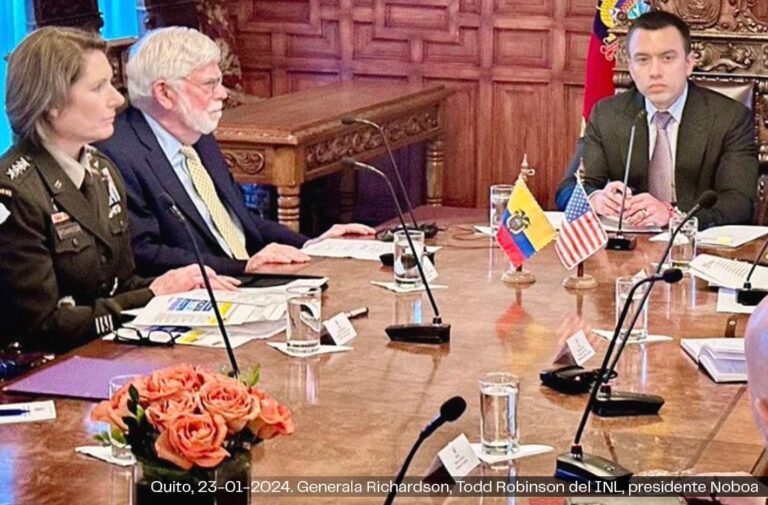
On January 22, Special Presidential Advisor for the Americas Christopher Dodd, Laura Richardson, Chief of the Southern Command, and Christopher Lambert, Deputy Assistant Secretary of the Bureau of Counternarcotics Affairs, arrived in Quito, Ecuador. High-level visit.
Already since 2018, under the presidency of Lenin Moreno, military exchange, training, intelligence, information sharing and military colleges agreements were signed, a legacy adapted from the ill-fated School of the Americas.
In 2021, the U.S. Secretary of State Blinken visited the Pacific region, including Ecuador.
In 2022, the US Congress approved the Partnership Act with Ecuador with the objective of countering “malign” foreign influence (Russia and China) and promoting US interests in the region, but limiting political autonomy, allocating resources to modernize the Armed Forces, including the use of Galapagos Island as an unofficial Air Base.
In 2023, Laura Richardson would surprise the world with statements on the US political-military priority in the region, at the Atlantic Council event, a think tank with close ties to NATO, where she was blunt, frank and direct. When asked why is Latin America important? The American general answered without hesitation: the strategic and abundant resources, highlighting the lithium triangle (Argentina, Chile, Bolivia), rare earths, oil reserves in Venezuela, the discoveries in Guyana, water, copper, gold and she put special emphasis on the Amazon,
Today we see the results of these visits and declarations: support for extreme right-wing governments and destabilization processes in countries with governments that do not agree with them, a series of measures against what they consider “a threat to their interests”, seeking to block the progress of trade, infrastructure and cultural relations between China and Russia and Latin America.
The high-level US visit to Ecuador this year, constitutes a “support” to President Novoa, but hides its real intentions in the region.
History says it clearly, this type of agreement with the US, far from having good intentions, seriously exposes the sovereignty of the countries, limits the autonomy of the peoples and deepens the logic of domination.
But this is not new, it comes from a number of strategies such as Operation Condor, the FTAA, Plan Colombia and Plan Patriot, among others, which have been mechanisms to establish dictatorships, support coups d’état, overthrow democratically elected but not like-minded governments, provoke instability, now the new thing, promote and encourage social chaos, fear and uncertainty sustained in the face of a multipolar order, which puts in check their hegemonies and forms of domination.
President Novoa finally allowed, this 2024, the US Southern Command to control the Military and Police Forces in Ecuador, to establish again a Military Base. The term of this agreement is for 5 years and the amount amounts to 93.4 million dollars. The Peruvian “government” is following the same route, and we cannot forget President Petro’s offers for the United States to “help take care of the Amazon”.
The US and narco-politics have walked hand in hand, that is why the US war on drugs is framed in a militarization strategy, which ends up benefiting the financial power and increases violence, generating the perfect excuse to militarize society and life itself.
In the 1980s, the CIA transported cocaine and crack through Colombian and Mexican drug cartels to finance the “contras”, a paramilitary group that sought to overthrow the Sandinista government in Nicaragua at the time.
Drug trafficking has ultimately become an instrument of military intervention and economic accumulation for the orbits of U.S. power.
Journalistic investigations have explained how the American Central Intelligence Agency – CIA – was involved in the creation of the Crack epidemic in Afro-American neighborhoods in the South, have highlighted how the Halliburton oil company was involved in special operations related to the smuggling of heroin in Iran and the control of 70 percent of the heroin that entered Western Europe, during the US military intervention in the Balkans in the 90s. Mexican President Manuel Lopez Obrador has expressed his dissatisfaction with the DEA’s actions in his country, among other examples.
The DEA uses the excuse of the fight against drug trafficking to infiltrate countries and control what happens there. A clear example is Colombia where, in spite of the U.S. military presence, the cartels grow in the same way as the production and commercialization of “the drug” increases. In this context, specialists suggest that the war on drugs is presented as a business that is on a par with oil, giving them financial, political, media and military power.
Speaking of narcotics, the DEA resembles the cats, if the latter were placed to fight sausages and salami.
source: eln-voces.net